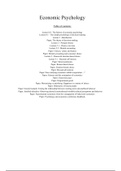Samenvatting
Summary Economic Psychology - all papers 2020/2021
- Instelling
- Tilburg University (UVT)
Hey there, Here comes a summary of all the papers and some lectures from 2020/2021. I hope it will help you too with getting a good grade on the course :) Good luck! Here is the complete list of the needed papers (you can find the detailed table of contents on the first page) List of all p...
[Meer zien]




